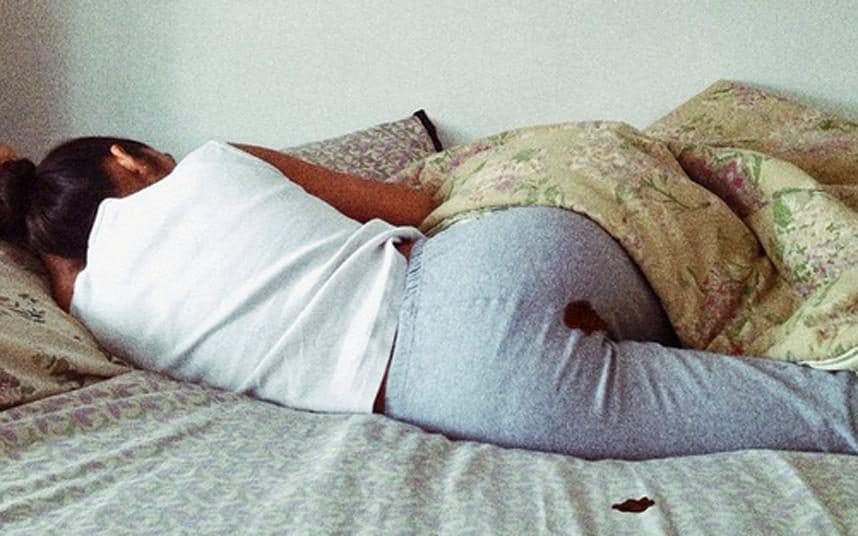You may remember a certain photograph of Rupi Kaur’s that was taken down initially by Instagram under terms of ‘violating community standards’.
The photo was of Kaur herself, lying on a bed with a few, small splodges of blood on her clothes and bed sheets. She was fully clothed, posted on a site that would allow only those following her to see the image, and it was neither malicious nor discriminatory. Yet it was banned twice by the social media site, and caused a backlash of debate, even fury, in commenters and the press. To me, a person with a uterus who has periods, it just looked like a familiar image of my dreaded second day of bleeding.
Two years on from this incident, and more challenges to the obscene treatment of menstruation in the media are being made. Stockholm’s metro art has recently been updated with a new installation. Graphic artist Liv Strömquist has added a series of sketches, entitled The Night Garden, to the walls of Slussens station. Her work includes images of nature, animals, pastoral landscapes, and people – some of whom are visibly menstruating. One of her cartoons gently reassures onlookers, “it’s alright, I’m only bleeding”.
Criticisers of Strömquist’s work have argued that they don’t want to be forced to think about menstruation on the subway on their way to work. One commuter was outraged by the thought of having to explain to her four year old the spot of blood on one of the supposed otherwise family friendly dancers. Nevertheless menstruation, by nature, belongs in the everyday. On the train. At a meeting. Sitting an exam. We don’t have a choice but to get on with our ordinary lives, with or without a period. Periods are not too overwhelming or gruesome to be reminded about on your commute to work. Plenty of them are happening right now. Chances are, if I’m on my period, I’m already thinking about them.
By bringing these harmless and completely natural images to our metros and galleries we are reinforcing the normality of a bodily function that happens to half the bodies in the world. How are we teaching young, developing people to love and accept their bodies if we shun representation or even acknowledgment of an integral part of so many of them?
“The way in which we think and communicate about menstruation is archaic, ignorant and deeply rooted in shame.”
Also seeking to remove some of the taboo surrounding menstruation is Period Piece, a multimedia show that forms part of the pop-up events being held at the new Science Gallery London. Creator of the project, academic Dr Alana Harris, aims to explore the natural rhythms of women’s bodies in relation to technology such as contraception and period tracking apps. In addition to holograms and film footage, the piece will involve biometrically-derived choral music for participators to listen to the rhythms.
In reaction to these projects, words like offensive, disgusting and unnecessary have been thrown endlessly around. However, none of the artists discussed have intended their work to be insulting or provocative. When they have explained their work, similar ideas of openness and empowerment, even celebration, are discussed – isn’t menstruation a key part of what enables us to give life after all? Isn’t that incredible? So then, it seems this is necessary. The way in which we think and communicate about menstruation is archaic, ignorant and deeply rooted in shame. Isn’t the disgusted reaction of people testament to the fact that menstruation is still viewed as something that needs to be hidden, almost as if to deny its existence?
Although these period artworks are still being met with some of the same incredulous cries of disgust and disdain, Stockholm Transport Company SL are staying with their decision to show Strömquist’s work, and Kaur’s photograph remains on Instagram after they eventually restored it to the site. The constant censorship of anything remotely truthful to the experience of menstruation is getting tiring, but art is proving to be a growingly unstoppable force to fight this.
Natasha Lyons
(Image courtesy of The Telegraph)

